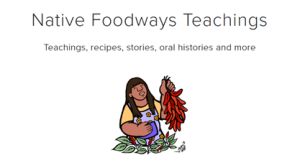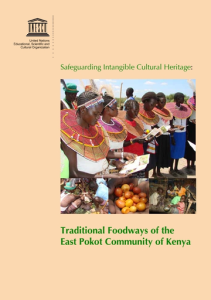IV. Resources on Foodways
This section provides several resources that expand on the theme of ICH pedagogies for teaching food systems by providing tools for educators designing and teaching courses on native food systems. Click on the title to access the resource.
Resource Library: Native Foodways Teachings

This resource expands on the theme of intangible cultural heritage (ICH) pedagogies for teaching food systems by providing resources for educators designing and teaching courses on native food systems. The website provides several reflective case study examples of how foodways have been taught in different contexts. Among the rich resources provided on the website are native foodway teaching lesson plans, podcasts, reflective essays, videos and related articles.
Manual:
Maundu, Patrick, Kapeta, Brian, Muiruri, Patel, Adeka, Ruth, Ombonya, Julia. (2013). Safeguarding intangible cultural heritage: a practical guide to documenting traditional foodways; using lessons from the Isukha and Pokot communities of Kenya. UNESCO Office Nairobi and Regional Bureau for Science in Africa

This manual supplements themes of teaching foodways outlined in the chapter through documentation of the work of traditional foodways that were carried out in Isukha and East Pokot areas of Kenya between 2010 and 2012. While the purpose of the manual is to document traditional foodways, it can also be adapted for documenting other non-food traditional ways. The book provides step by step instructions for how to document foodways, including an outline of the criteria to use for identifying participating schools, pupils and communities, preparation needed before data collection begins and ways to manage and collect the data. In addition to the general guidelines, the manual provides sample questions that were used in Isukha and Pokot. This manual can be useful for both teachers, young students, researchers and community developers interested in traditional foodways.
Article:
Luby C, Cornelius D, Goldman I. Learning from the land: Developing a course on Indigenous foodways. Nat Sci Educ. 2021; 50:e20072. https://doi.org/10.1002/nse2.20072
This article provides an example of teaching indigenous foodways that was developed at the University of Wisconsin-Madison called: ‘Horticulture 380: Indigenous Foodways’. The authors consulted with Indigenous partners in the region to create a course focused on the foodways of the Indigenous peoples of the Upper Great Lakes positioned in Indigenous knowledge systems related to food and farming. The authors provided students with experiential learning opportunities in Indigenous foodways of the region such as tapping maple trees for syrup, butchering deer, cooking with the three sisters (corn, beans, and squash), and spearfishing. These experiences facilitated the students’ ability to understand the connection between foodways in terms of place and land in a different way than industrialized food systems.
